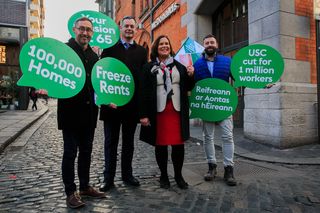O’Brien pushes for rent increase cap of 2pc to come into force next month
A cap on rent increases of as little as 2pc could come into force as early as next month.
Housing Minister Darragh O’Brien is pushing for a 2pc cap that could be signed off by the Cabinet by the end of this month.
The Attorney General is also involved in crafting the new measures, which would see rents rising in line with general inflation to a maximum value of 2pc.
It is understood there has not been any push-back as yet from Mr O’Brien’s coalition partners in relation to the cap.
Despite moving to link rent increases to inflation earlier this year, the measure quickly backfired after the inflation rate used to determine rents in rent pressure zones (RPZs) shot up to 3pc.
Previously, RPZs saw rent caps set at 4pc, which soon became a target for some landlords when increasing rents.
With around three-quarters of all tenancies in areas designated as RPZs, Mr O’Brien is under intense pressure to help alleviate the burden for renters after opposition parties pointed out that there was little in Tuesday’s Budget to help them with the spiralling cost of rent.
The Government has also been accused of forgetting about the plight of renters, although Mr O’Brien said the Housing for All plan will see an increase in the supply of homes, which will in turn reduce the cost of rent.
Ministers were forced to bat away accusations on Tuesday that the Government does not care about renters, in turn arguing that increasing the supply of homes will be the biggest help for reducing the cost of rent.
Read more
Mr O’Brien is also working with the Attorney General to bring in indefinite tenancies before Christmas.
Currently, renters enter a ‘Part 4’ tenancy six months into their lease, which means they cannot be evicted apart from over a list of specified reasons, including substantive refurbishment to the property if the landlord has decided to move back in themselves or if the tenant has not complied with the tenancy.
The tenancy can also be ended if they have not paid their rent, if the home will be sold within the next three months, if the home is not suited for the renter or if it is intended to change the use of the dwelling.
After five-and-a-half years, the landlord can evict the tenants without providing one of the seven reasons stated by the Residential Tenancies Board.
It is understood Mr O’Brien is seeking to remove the time limit and to instead pave a path for indefinite tenures as part of Housing for All.
However, there is now significant political pressure for him to act to support tenants after landlords received a tax break in the Budget, with relief on re-letting costs extended for a further three years.
Sinn Féin leader Mary Lou McDonald accused the Government of refusing to “show up” for renters in the Budget, saying they had been left “high and dry”.
She said renters are locked into a “nightmare” and are unable to save up for a deposit to buy their own home.
“There are 300,000 households and 750,000 people. That’s who renters are,” she said.
“Those who wish to get a deposit together really don’t stand a chance of doing so. They are locked into what can only be described as a nightmare.
“Rents have started to spiral out of control, yet again, and the long-promised supply of affordable accommodation has not materialised.
“And now, to top it all, you announce a Budget, that does nothing for renters.”
The Taoiseach responded by saying there is a series of measures to help renters under the Housing for All strategy, which includes the Land Development Agency (LDA) and local authorities “providing affordable houses for young people, and in particular for people who are currently renting, to be able to buy houses that they can afford”.
Meanwhile, Sinn Féin’s housing spokesperson, Eoin Ó Broin, said the Budget will not deliver 4,000 affordable homes as promised and will instead deliver only a maximum of 1,250.
The Budget stated that the First Home shared equity scheme will see the delivery of 1,750 homes, there will also be 750 new cost rental homes, as well as 500 under the Afford- able Housing Fund and another 1,000 homes through the LDA, totalling 4,000.
However, Mr Ó Broin said the homes to be delivered through the LDA are “aspirational” and “not in the pipeline”.
Those delivered under the shared equity scheme “will not be affordable”, he said .
Mr Ó Broin argued that from his reading of the Budget, there is a total of €130m allocated for the provision of 1,250 affordable homes and not 4,000.
“This is worse than I thought Darragh O’Brien was going to do,” he said.
“If the housing budget was a battle between Fianna Fáil and Fine Gael, between increased direct investment in social affordable homes or a continuation of the same Rebuilding Ireland framework, then Fine Gael have won, hands down.”
Mr Ó Broin said if Sinn Féin was currently in government, they would lower the cap on rent increases to 0pc in an effort to effectively freeze rents.
Read more
Join the Irish Independent WhatsApp channel
Stay up to date with all the latest news














